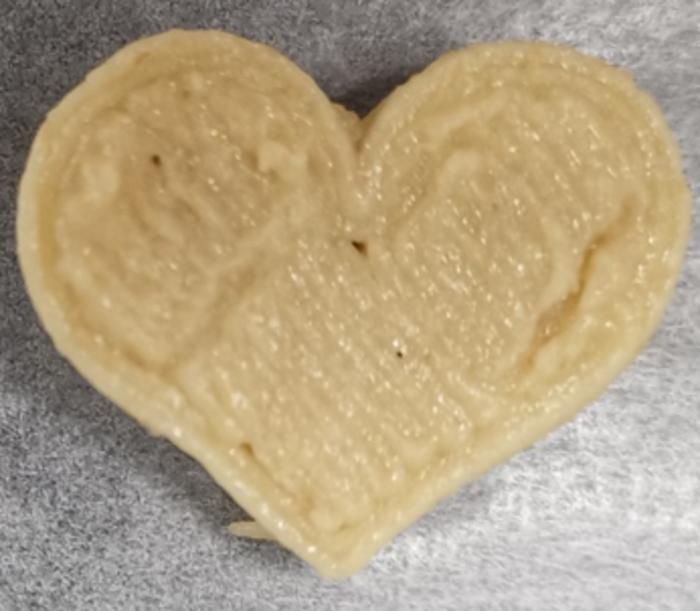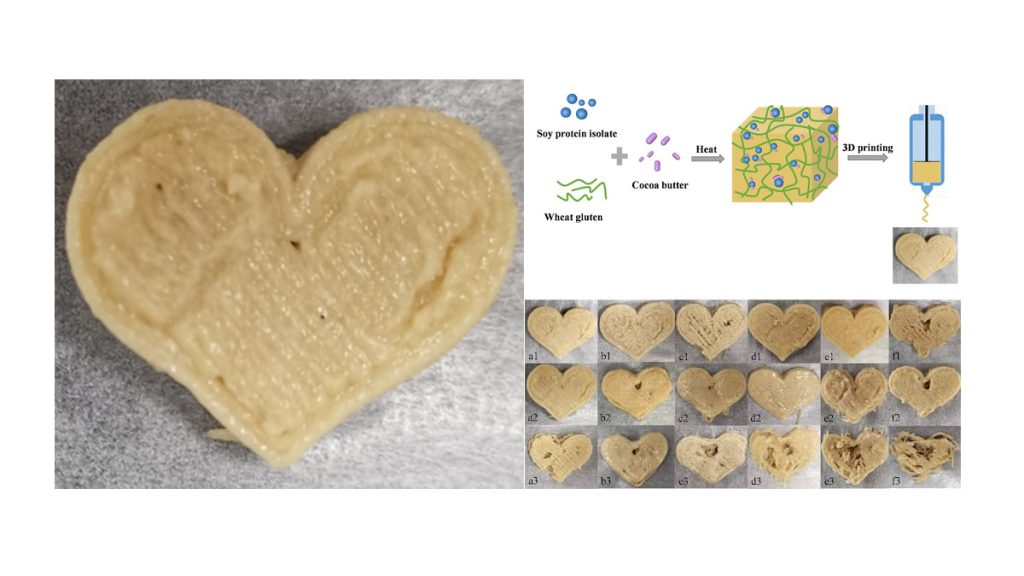A duo of researchers from Zhejiang University, China, has developed a number of new edible plant-based gel materials that can be used to 3D print meat-like foods.
The 3D printable meat alternatives contain ingredients such as soy protein, pea protein, and wheat gluten, boasting the nutritional value of real meat without the associated health and sustainability costs. Interestingly, the most successful formulations also featured cocoa butter as a component, which is a fat extracted from the cocoa bean.
The team investigated the effects of protein, starch, and sodium alginate on the extrudability and printing accuracy of the materials, reporting the results in ACS Food Science & Technology.

3D printing and plant-based meat alternatives
So why 3D print food in the first place? 3D printing food can give rise to personalized meals, as the technology provides the control necessary to carefully select the amount of protein, sugar, vitamins, and minerals we want in a particular meal. While this may seem unnecessary to the average person living in the 21st century, these capabilities are still useful for those with special dietary requirements, those serving in the armed forces in remote locations, and the elderly.
With topics such as sustainability, animal ethics, and healthy eating gaining prominence in mainstream media, we’ve also seen a huge rise in the availability of plant-based meat alternatives.
This ‘fake meat’ revolution tends to rely on components such as soybeans, wheat, or peas in order to maintain the texture and nutrients of the real thing. Soy, in particular, provides an excellent source of protein, all while eliminating the cholesterol and saturated fats found in most conventional red meats.
The Zhejiang team wanted to combine these worlds, fusing the personalization benefits of 3D printing with the health and sustainability advantages of meat alternatives.
Cocoa butter, Tween-80, and sodium alginate
Kicking off the experiment, the scientists initially formulated several soy and wheat-based gels for 3D printing. The mixtures were evaluated based on their printability and final structural integrity (how well they held their shape).
The results of the study showed that adding appropriate amounts of cocoa butter, Tween-80 (an emulsifier), and sodium alginate were essential when it came to achieving a superior 3D printing performance.
The Tween-80 and sodium alginate were crucial for controlling the texture of the gels. The heat-sensitive cocoa butter, on the other hand, proved useful in providing fluidity during the high-temperature printing process, making the gels more extrudable. The ingredient also provided solidity when back at room temperature, allowing the printed structures to better maintain their shapes.
Naturally, the gluten and soy-based gels were unsuitable for individuals with allergies to those ingredients, so a number of pea-based 3D printing materials were also developed. Unfortunately, the team found these alternatives to be too soft to print but still believed the work helped to validate a new approach to developing plant-based meat alternatives.

Despite its infancy, there are already several companies operating in the food 3D printing space. Earlier this month, Redefine Meat rolled out its New-Meat range of plant-based 3D printed meat products to high-end restaurants throughout Europe. Having launched its New-Meat range to selected restaurants in Israel earlier in the year, this latest milestone by the company reportedly marks the first time high-end restaurants will offer plant-based whole cuts as part of their menus.
Elsewhere, MeaTech, an Israeli food technology firm focused on 3D bioprinting real meat products, recently printed a 3.67 oz (104 gram) cultivated steak at its lab in Ness Ziona, Israel. Shifting gears, the steak is composed entirely of real fat and muscle cells, meaning it doesn’t rely on any meat-free alternatives like soy or pea protein.
Subscribe to the 3D Printing Industry newsletter for the latest news in additive manufacturing. You can also stay connected by following us on Twitter, liking us on Facebook, and tuning into the 3D Printing Industry YouTube Channel.
Looking for a career in additive manufacturing? Visit 3D Printing Jobs for a selection of roles in the industry.
Featured image shows a 3D printed ‘fake meat’ structure featuring soy, wheat, and cocoa butter. Photo via Zhejiang University.



